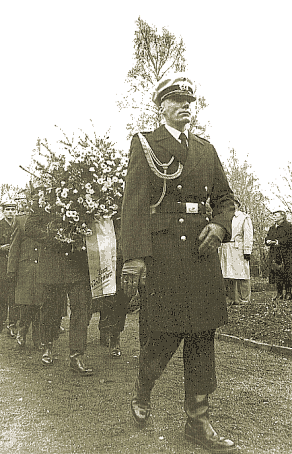"Folk" has a cognate in almost every other Germanic language, all deriving from the proto-Germanic "fulka". German, Dutch and Afrikaans all say "völk", and Danish, English Norwegian, etc., all say "folk".
Afrikaans all say "völk", and Danish, English Norwegian, etc., all say "folk".
A "völkisch" movement is populist, romantic, and organic. It has its roots in an almost spiritual blend of "Romantic Nationalism", or even Hyper-Nationalism. The Germans combined it with sentimental patriotic interests in Germanic folklore, local history, and "back-to-the-land" anti-urban populism. It's a kind of Rousseau-ean self-sufficiency combined with a mystical mixture of land-based mythology. The resurgence of this ideal, and the folk arts, is obviously a reaction to the industrial revolution. But also, for Germans, a resurgence of Germanophilia and Germanic-centered politics. A belief that Germany will take its rightful place in the world as leader of the human race.
German nationalism is very dfferent from American nationalism. The Vanderbilt Agrarians of the American South wrote an Agrarian Manifesto defending the lifestyle of the agarian South titled "I'll Take My Stand"--and this formed a kind of conservative folk populism in the 1930s. Post-Civil War still harbored a lot of folk nationalism in the South. But völkisch movements aren't always conservative. In the early half of the 20th Century with the rise of nationalism in Italy and Germany, the US, and everywhere else, it was conservative. After WWI the Germans invoked the will of the volk, the people, for inspiration and nationalism. It was the symbol of racial purity for the South, the fascists and the Nazis. Yet at the same time, Völk was also used by the international socialist parties in the German lands as a synonym for the proletariat--not a racial symbol, but a proletarian symbol.
The Leftist view of the folk life still exists today, and emphasizes things like folk music, black-letter calligraphy, runes, and Medieval legendry, much in the same way that the American left popularized folk-singing, ballads, and organic farming in the 1960s. German völks pre-dated the Nazis, back to Otto von Bismarck at least. The painting on the left depicts Bismarck "Proclaiming the German Empire" in 1871. But it quickly became bound to Nazism. Völkisch Nazis met to celebrate the summer solstice and more regularly to read the Eddas and German mystics. From watching films like "Triumph de Willens" you get the idea that Hitler invoked and used the hyper-nationalist sentiments for the Nazi movement, as evidenced by the youth cadres playing and singing nationalist songs and the tellng of a kind of national folk stories. Or national epic. The Nazi Party first recruited from groups like retro-nationalist "Teutonic Order" or groups like the "Tatkreis", a Weimar "revolutionary conservative" group, and drew heavily from their membership. All this völkish nationalism is what elected Hitler in 1933.
German völks pre-dated the Nazis, back to Otto von Bismarck at least. The painting on the left depicts Bismarck "Proclaiming the German Empire" in 1871. But it quickly became bound to Nazism. Völkisch Nazis met to celebrate the summer solstice and more regularly to read the Eddas and German mystics. From watching films like "Triumph de Willens" you get the idea that Hitler invoked and used the hyper-nationalist sentiments for the Nazi movement, as evidenced by the youth cadres playing and singing nationalist songs and the tellng of a kind of national folk stories. Or national epic. The Nazi Party first recruited from groups like retro-nationalist "Teutonic Order" or groups like the "Tatkreis", a Weimar "revolutionary conservative" group, and drew heavily from their membership. All this völkish nationalism is what elected Hitler in 1933. There are dozens of these secret societies which influenced the Third Reich. But another völkisch movement, the occultist Thule Society, was transformed by Hitler into the German Worker's Party, which then became the Nazi Party. Thule is the land furthest north, according the Greco-Roman historians. It was also considered the capital of Hyperborea to the Nazi mystics, who re-inrepreted Nietzsche as well. Nietzsche called himself a Hyperborean in The Anti-Christ. I always believed he was referring to a mystical version of Scandinavia. But "Thule" has been the subject of much Nazi mysticism (and also the Theosophist mysticism of Blavatsky.)
There are dozens of these secret societies which influenced the Third Reich. But another völkisch movement, the occultist Thule Society, was transformed by Hitler into the German Worker's Party, which then became the Nazi Party. Thule is the land furthest north, according the Greco-Roman historians. It was also considered the capital of Hyperborea to the Nazi mystics, who re-inrepreted Nietzsche as well. Nietzsche called himself a Hyperborean in The Anti-Christ. I always believed he was referring to a mystical version of Scandinavia. But "Thule" has been the subject of much Nazi mysticism (and also the Theosophist mysticism of Blavatsky.)
Nazi historians, and Nazis too, claimed that the Thule Society paved the way for the Führer. In Rudolf von Sebottendorff's book Before Hitler Came, he said, "Thulers were the ones to whom Hitler first came, and Thulers were the first to unite themselves with Hitler." But after Hitler brought them into the party, the Nazis then suppressed the folk groups and closed their lodges down. Sebottendorff's book was banned. Many occult ideas found favor with Himmler, who, unlike Hitler who denounced occultism in Nuremberg, had a great interest in mysticism, but the SS under Himmler more closely emulated the ethos and structure of Ignatius Loyola's Jesuit order rather than the Thule Society.
Friday, May 25, 2007
The German Völk -- Leftist, Fascist, Nazist
Subscribe to:
Post Comments (Atom)
.png)


2 comments:
Germans, Dutch, Afrikaners all say "Volk" or "volk" respectively. Only the German adjective of Volk reads "völkisch" with diacritics. The word "Völk" does not exist in neither language.
It can be interpreted as Folksy -
Volkisch - of the Volk
Folksy ditto
Post a Comment